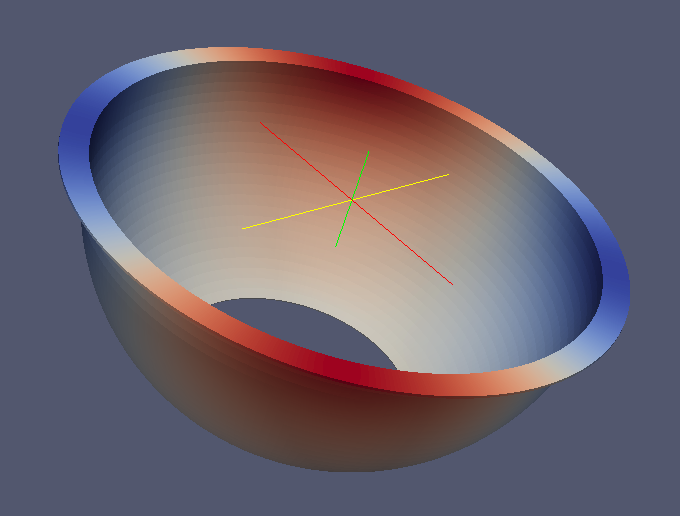
Solid-wave MEMS gyroscopes
Building simulation tools to understand the challenges in miniaturizing the current gyro-of-choice for space applications. Success means MEMS IN SPACE!
Summary
Solid-wave hemispherical resonator gyroscopes (HRGs) have become the gyroscope of choice for satellites and other spacecraft. G. H. Bryan worked out the relevant physics in 1890 in order to describe the beating sound produced by a ringing wine glass placed on a turntable. Coriolis forces break the symmetry between how waves travel clockwise and counter-clockwise: similar to the Doppler effect, elastic waves appear to travel faster or slower depending on the direction in which they travel relative to the rotation. As a result, the “shape” of vibration patterns in the non-inertial reference frame, which we can think of as arising from interference of waves traveling clockwise and counterclockwise, rotates counter the frame rotation. The total rotation of the shape measures the total rotation of the gyroscope.
To design precision MEMS solid-wave gyroscopes similar to the HRG, we need to understand how microfabrication problems affect device performance. We tackle this by using both fast finite element simulations and qualitative techniques to reason about what types of fabrication issues we expect and how they might influence these sensors.
Related
Papers
@article{2016-sensors,
author = {Yilmaz, Erdal and Bindel, David},
title = {Temperature Sensitivity and Shape Optimization of
Solid-State Wave Gyroscopes},
journal = {IEEE Sensors},
volume = {16},
number = {6},
pages = {6213--6221},
year = {2016},
doi = {10.1109/JSEN.2016.2580670}
}
Abstract:
We analyze the change of angular gain and vibration frequency of solid-state wave gyroscopes as a result of geometry perturbations due to thermal expansion. We analyze sensitivity of the device to thermal expansion effects by an isoparametric finite element analysis method, and we analyze the sensitivity to thermal changes in the material properties assuming a linear dependence on temperature. We quantify these sensitivities for common device geometries, and use our analysis as the basis for a local optimization problem that minimizes temperature sensitivity as a function of device shape.
@inproceedings{2016-hh-workshop,
author = {Yilmaz, Erdal and Bindel, David},
booktitle = {Proceedings of the Hilton Head Solid-Sate Sensor and
Actuator Workshop 2016},
title = {Temperature Sensitivity of Solid-Wave Gyroscopes (Late News)},
month = jun,
year = {2016}
}
Abstract:
We analyze the change of angular gain and vibration frequency of solid-wave gyroscopes as a result of geometry perturbations due to thermal expansion. We formulate a temperature sensitivity analysis by assuming a linear dependence of material properties to temperature, and quantify it for common device geometries.
@inproceedings{2013-sensors,
author = {Yilmaz, Erdal and Bindel, David},
title = {Effects of imperfections on solid-wave gyroscope dynamics},
booktitle = {Proceedings of IEEE SENSORS 2013},
month = nov,
year = {2013},
doi = {10.1109/ICSENS.2013.6688462}
}
Abstract:
Solid-wave gyroscopes are symmetric resonators that sense rotation by measuring how Coriolis forces perturb a degenerate mode pair. The idealized dynamics of these devices are described by ODE models of two identical oscillators coupled by a perturbation due to rotation. In miniaturized solid-wave gyroscopes, geometric distortions due to imperfect fabrication also perturb the dynamics, and this limits sensing accuracy. In this work, we describe how geometric imperfections affect the dynamics of solid-wave gyroscopes. We also use selection rules both to find qualitative information about what types of geometry perturbations most affect sensor performance and to accelerate computations
Talks
Music of the Microspheres
Householder Symposium
gyro mems
•
meeting external invited plenary
Music of the Microspheres
Oxford University NA Seminar
gyro mems
•
seminar external invited
Music of the Microspheres
UMCP NA Seminar
gyro mems
•
seminar external invited
Music of the Microspheres
Seminar at UTRC
gyro mems survey
•
seminar external invited
Music of the Microspheres
Tufts/Schlumberger Scientific Computing Seminar
gyro mems
•
seminar external invited
Computer Aided Design of Micro-Electro-Mechanical Systems
Civil Engineering Seminar at Duke
gyro mems pml rf-mems rom ted
•
seminar external invited
Computer Aided Design of Micro-Electro-Mechanical Systems
SCMS Workshop on Recent Advances in Scientific Computing,
Fudan University
gyro mems pml rf-mems rom ted
•
meeting external invited
Computer Aided Design of Micro-Electro-Mechanical Systems
FIST Workshop at Shanghai Tech
gyro mems pml rf-mems rom ted
•
meeting external invited
